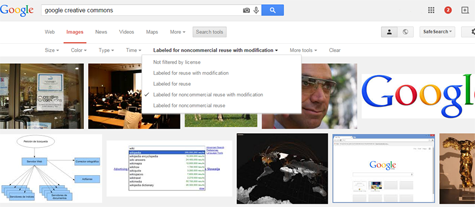Bloggers Beware: Image Copyright Infringement Is Costly

Over the last few years, there has been a spate of bloggers, content marketers and social media users hit with hefty fines for infringing image copyrights.
There is little to no defense against copyright infringement and the fines can run into 100s if not 1000s of pounds, dollars or whatever currency you have to pay the fine in.
Copyright law in the digital arena, however, is something of a minefield. The law is strict in parts and vague in others. Furthermore, the online system does not do enough to protect copyright, resulting in an easy trap for bloggers (and anyone who publishes content on the Web) to fall into.
What are Copyright laws
The fundamental rule of copyright is simple. Anybody who creates a piece of original creative work has ownership rights. Intellectual property protected by copyright laws includes writing, photographs, video, paintings, graphic art, choreography, sculptures, infographics, and anything else that has been created as an original.
The copyright owner has exclusive rights to their intellectual property, but if they choose can also give permissions that allow third parties to use their work.
However, the law does not make any provision that creative work must explicitly be flagged as copyright, but it does make a provision for "fair use," and this is where problems in the digital arena can arise.

Understanding "fair use"
Fair use of creative work is a complex body of law. It does not always make a good defense either so if you are unsure whether or not you can fairly use somebody else's work, play it safe and do not use it.
Where the law is clear about fair use in the virtual world (and offline) are situations in which the intellectual property is being used to support another body of work. They are as follows:
- A small percentage of owned intellectual property - this allows writers, reviewers and commentators etc., to quote other peoples work for the purpose of supporting their own ideas.
- A single screenshot - allows you to capture a scene from film, TV or video game to support a critique or commentary
- Teaching and lecturing - if you are giving an online lecture, you can use intellectual property to summarily your point
- Quoting song titles as part of a review - you have to be careful when quoting song titles, but it can be used in reviews or to emphasis a point in an article which the lyric bears relevance
The principles behind fair use can be ambiguous, but the rule of thumb is if you are not sure whether or not you can use creative property, do not use it without seeking permission from the rights owner first. Learn more about fair use here.
You should also note that there are no "fair use" rights in relation to images.
What constitutes a breach of copyright laws?
There is practically no legitimate defense against the violation of copyright. The courts will rule that you have breached copyright ownership if you use creative content without permission.
A breach of copyright will usually result in a fine, and the following is not a defense for copyright infringement:
- You did not know the material was copyright
- You have removed the image and no longer using it
- You modified the original image (you need permission for this)
- You acknowledged the original creator
- You are not making money from the copyrighted work
- Using a disclaimer on your website
So how about embedding a video into your blog post? Thankfully, the Seven Circuit Court of Appeals in the United States ruled that embedding a video from a third-party site such as YouTube does not constitute a copyright infringement. Now you can breathe a sigh of relief!
Using creative works in the digital arena
The digital landscape does not protect the copyright ownership for authors, but nor does it protect unwitting bloggers who do not realize they are using copyrighted material.
One common failing is using free image sites. The site may inform you that their images are royalty free, but it does not mean that the individual who made the image available had the right to do so.
The only way to avoid misusing copyright-free image is to use sites like Flickr and creativecommons.org etc., whereby the images are posted by the copyright owners themselves and state under which circumstance, if any, their images can be used under a creative commons license.
The creative commons license gives copyright owners the opportunity to attribute certain permission to their intellectual property. A common licence is to allow third parties the right to use a copyrighted work on the provision the copyright owner is acknowledged as the original creator.
Then again, the digital arena has clouded when creative commons licenses can be used and when they cannot. And this is the trap content curators are falling into.
If you search for images under Google creative commons for example, details of the copyright owner are not given, nor does it stipulate whether there is an attribution attached to the image.

However, because it is in Google creative commons, unwitting bloggers assume the images are okay to use. And you know what "ass-u-me" means.
Using images posted on social media sites like Facebook, Pinterest and Tumblr are equally ambiguous. By pinning an image to your account you are claiming ownership of that work.
The rules also state, however, that if you repin or share an image, you are claiming it as your own. So if you share an image on Facebook that did not originate from the copyright owner, you breach copyright laws.
Will it come to this? In light of current laws and actions it is difficult to say!
Copyright fines
The digital bombs in the virtual world are starting to blow up in the real faces of content curators. And the pin is being pulled by legal representatives of image sharing merchants like Getty Images and Corbis.
And the lawyers are aggressive. They send out strongly worded threatening letters instructing you to "cease and desist" using images. That is fair enough. But the sharks also demand you pay a fine and threaten court proceedings if you refuse to pay.
Getty and Corbis have been accused of taking advantage of a failure in the system and are acting unethically by collecting money by means of "extortion".
Given both firms have the tools and responsibility to protect images, it should be questioned whether they are doing enough to protect the work of copyright owners, together with online users that unwittingly violate copyright laws.
Michael Chan, a leading copyright defense lawyer and co-founder of extortionletterinfo.com, a websites specifically set up to offer advice about how to deal with aggressive cease and desist letters, says Corbis and Getty are "using the court system as a collection mechanism."
Whether Getty or Corbis are acting unethical is a moot point. The law is on the side of the corporations. The only defense bloggers have of dodging fines is to avoid infringing copyright in the first place.
Therefore, the only assumption you should be making is that all intellectual property is copyright and cannot be used unless the owner has given permission by means of an attribution license.
With regard to sharing image content on social media accounts, approach with caution - it could be another gaping hole in the law waiting for people to fall into.








